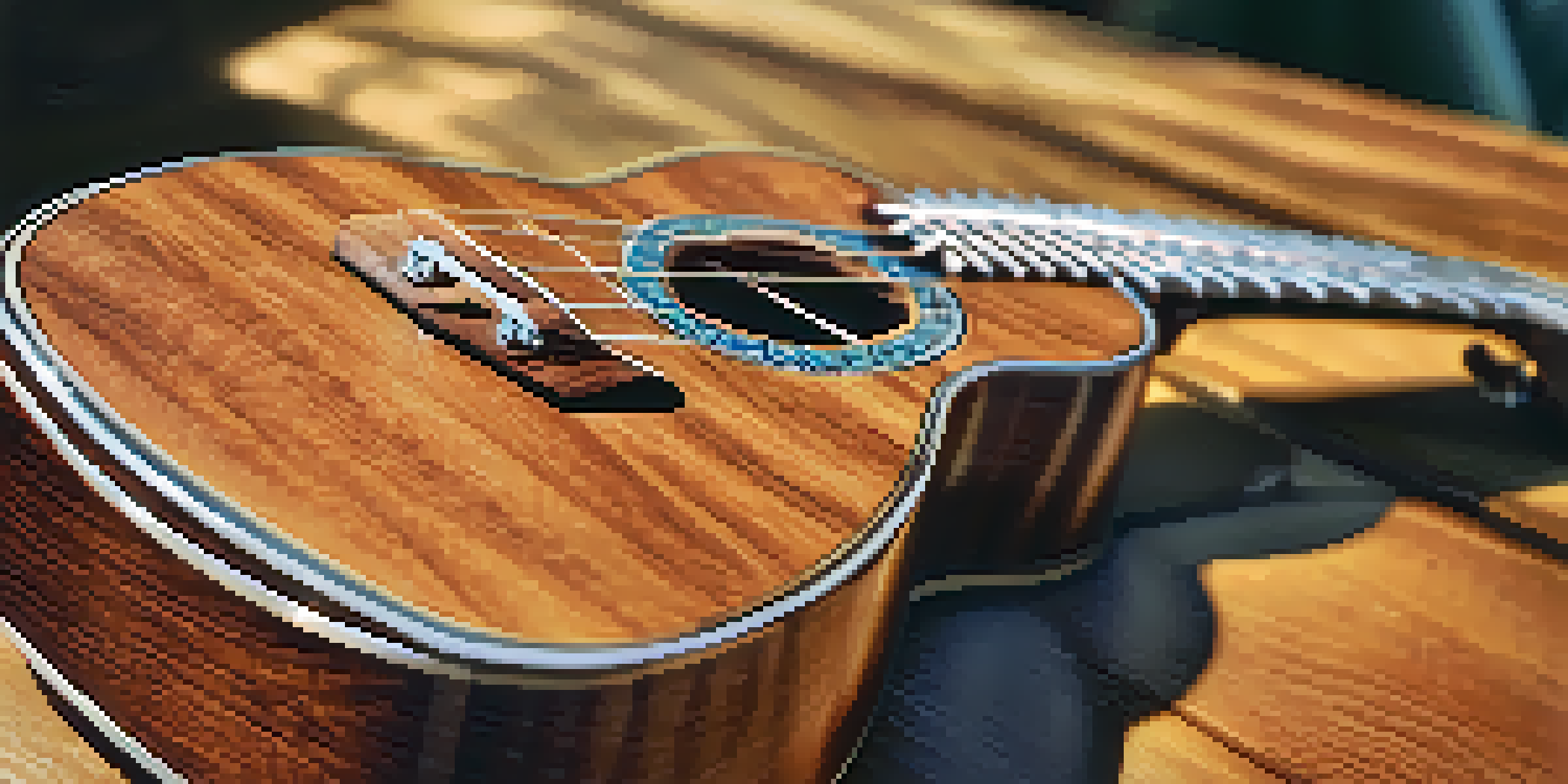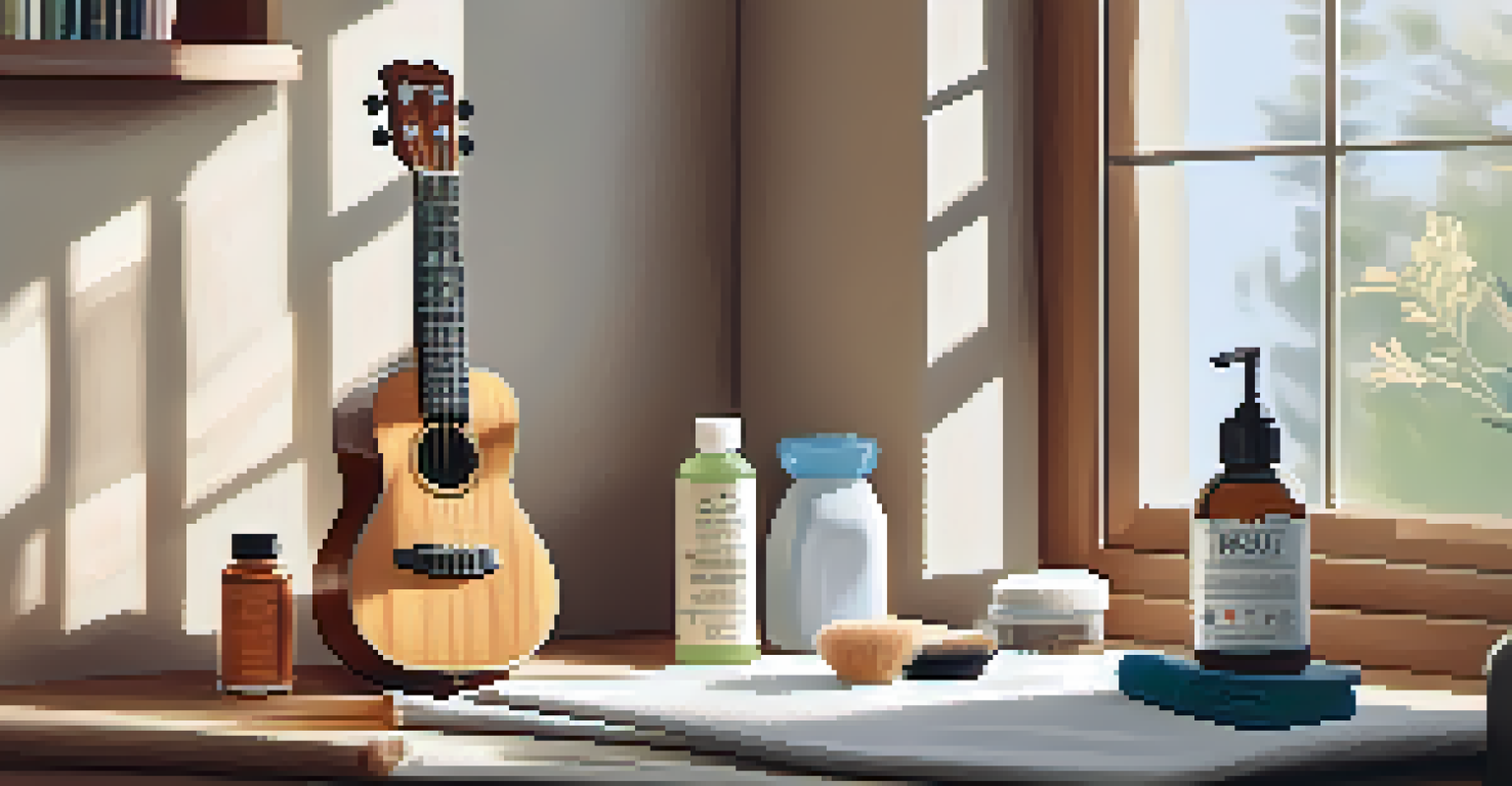How to Properly Clean Your Ukulele for Optimal Longevity

Understanding the Importance of Cleaning Your Ukulele
Just like any musical instrument, your ukulele deserves some love and care. Regular cleaning not only helps to maintain its aesthetic appeal but also ensures it produces the best sound possible. Over time, dirt, sweat, and oils from your fingers can accumulate, affecting both the look and the sound quality of your instrument.
The beautiful thing about learning is that no one can take it away from you.
Think of your ukulele as a cherished friend—you wouldn’t let dust and grime build up on them, right? By keeping it clean, you’re not only prolonging its lifespan but also enhancing your playing experience. A well-maintained ukulele will resonate beautifully and inspire you to play more often.
Plus, cleaning your ukulele is a straightforward process that can be easily integrated into your routine. With just a little time and effort, you can ensure your instrument remains in optimal condition for years to come.
Gathering the Right Cleaning Supplies
Before diving into the cleaning process, it’s essential to have the right supplies on hand. You’ll typically need a soft, lint-free cloth, mild soap, and a soft-bristled brush. If your ukulele has a glossy finish, consider using a specific polish designed for string instruments to maintain that shine.

Many players also find it helpful to have a microfiber cloth to tackle fingerprints and smudges effectively. Remember, the goal here is to clean without scratching or damaging the surface, so avoid any abrasive materials. It’s like preparing for a picnic—you want to have everything you need for a fun day out!
Regular Cleaning Enhances Sound
Keeping your ukulele clean not only improves its appearance but also ensures optimal sound quality.
Finally, ensure that you’re working in a well-lit area, so you can see any dirt or grime that needs attention. With your supplies gathered, you’re ready to give your ukulele the care it deserves.
Cleaning the Body of Your Ukulele
Start by gently wiping down the body of your ukulele with a soft cloth. This will remove any dust and fingerprints that have accumulated. If you notice any stubborn spots, slightly dampen your cloth with water or a mild soap solution, but be careful not to get moisture in any of the openings.
A musical instrument is like a friend; you must take care of it to enjoy its full potential.
Think of this step like giving your ukulele a soothing bath—gentle and careful to avoid any damage. For those hard-to-reach areas, a soft-bristled brush can effectively sweep away dust without scratching the finish. Just remember, less is more; you want to be thorough without overdoing it.
Once you’ve cleaned the body, take a moment to admire your work. A clean ukulele not only looks great but also feels great to play, inspiring you to pick it up and strum away!
Caring for the Strings and Fretboard
The strings and fretboard are crucial components of your ukulele, and proper care is essential to maintain their quality. To clean the strings, use a cloth to wipe them down after each use; this simple habit can prevent build-up and extend their lifespan. Additionally, you can use a specialized string cleaner for a deeper clean.
When it comes to the fretboard, make sure you’re using a product specifically designed for the wood type of your instrument. A little oil can go a long way in keeping the wood hydrated and preventing it from drying out. Think of it as a moisturizer for your ukulele, ensuring it stays healthy and beautiful.
Proper Storage Prolongs Lifespan
Storing your ukulele in a safe environment protects it from damage and maintains its condition.
Regularly checking your strings and fretboard can also help you catch any wear or damage early on. This proactive approach can save you time and money in the long run, allowing you to keep your music flowing smoothly.
Cleaning the Ukulele’s Hardware
The hardware, including tuning pegs and bridge, is just as important as the body and strings. Start by gently wiping these areas with a clean cloth to remove any dirt or grime. If you notice any rust or corrosion, a small amount of vinegar or a specialized cleaner can help restore their shine—just be sure to apply it sparingly.
In this process, think of your ukulele’s hardware as the engine of a car; it needs regular maintenance to keep everything running smoothly. Ensuring that all parts are clean will not only enhance the look of your instrument but also improve its functionality. No one wants a ukulele that’s hard to tune!
Lastly, always check for loose screws or parts while you’re cleaning. Tightening them can prevent further issues and ensure your ukulele remains in top playing condition.
Storing Your Ukulele Properly After Cleaning
Once your ukulele is clean and gleaming, it’s important to store it properly to maintain its condition. Avoid leaving it in direct sunlight or in damp areas, as these environments can damage both the wood and finish over time. Instead, consider using a case or gig bag to protect it when not in use.
Storing your ukulele is like tucking it into a cozy bed after a long day of playing. You want to ensure it’s safe and sound, away from potential harm. If possible, store it in a climate-controlled room to keep it safe from extreme temperatures and humidity.
Seek Professional Help When Needed
Consulting a luthier for significant issues ensures your ukulele remains in peak condition for years.
Additionally, consider loosening the strings slightly if you know you won’t be playing for an extended period. This helps to relieve tension on the neck and body, promoting longevity. With proper storage, your ukulele will be ready for your next jam session!
Regular Maintenance Tips for Ukulele Care
Incorporating regular maintenance into your routine can significantly extend the life of your ukulele. Aim to clean the body and strings after every few playing sessions, while giving the fretboard a deeper clean every few weeks. This consistent care will keep your instrument sounding great and looking pristine.
Think of maintenance as a tune-up for your ukulele; just like a car needs regular oil changes, your instrument requires attention too. Setting a schedule can help you stay on top of this, making it a part of your music practice rather than a chore. Just a few minutes here and there can make a world of difference.

Also, don’t forget to regularly check the tuning and intonation of your ukulele. These aspects can change over time, and making adjustments ensures you always sound your best. With a few simple habits, your ukulele will be a reliable companion for all your musical adventures.
Knowing When to Seek Professional Help
While regular cleaning and maintenance can go a long way, there may come a time when your ukulele needs professional attention. If you notice any significant damage, such as cracks or warping, it’s crucial to consult a luthier or qualified technician. They can provide repairs that will ensure your instrument remains in peak condition.
Identifying when to seek help is like knowing when to visit the doctor; sometimes, self-care isn’t enough. A professional can also offer valuable advice on additional maintenance specific to your ukulele’s make and model. Don’t hesitate to reach out if you’re unsure about something—you want your ukulele to sound its best!
Ultimately, investing in professional care when needed will keep your beloved ukulele playing beautifully for years to come. Remember, a little help can go a long way in preserving your musical companion!